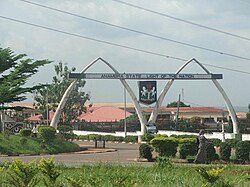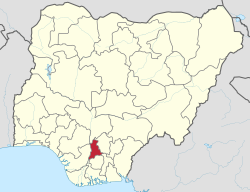Anambra State
| Anambra | ||
|---|---|---|
| State | ||

Anambra State
|
||
|
||
| Nickname(s): Light of the Nation Igbo: Ife Mbà |
||
 Location of Anambra in Nigeria |
||
| Coordinates: 6°20′N 7°00′E / 6.333°N 7.000°ECoordinates: 6°20′N 7°00′E / 6.333°N 7.000°E | ||
| Country |
|
|
| Date created | 27 August 1991 | |
| Capital | Awka | |
| Government | ||
| • Governor | Willie Obiano (APGA) | |
| • Deputy Governor | Nkem Okeke | |
| • Legislature | Anambra State House Of Assembly | |
| Area | ||
| • Total | 4,844 km2 (1,870 sq mi) | |
| Area rank | 35 of 36 | |
| Population (2006 census) | ||
| • Total | 4,055,048 | |
| • Rank | 10 of 36 | |
| • Density | 840/km2 (2,200/sq mi) | |
| Demonym(s) | Anambrarian | |
| GDP (PPP) | ||
| • Year | 2007 | |
| • Total | $11.83 billion | |
| • Per capita | $1,615 | |
| Time zone | WAT (UTC+01) | |
| ISO 3166 code | NG-AN | |
| Website | anambrastate.gov.ng | |
| ^1 Preliminary results | ||
Anambra is a state in southeastern Nigeria. Its name is an anglicized version of the original 'Oma Mbala', the native name of the Anambra River. The capital and seat of government is Awka. Onitsha and Nnewi are the biggest commercial and industrial cities respectively. The state's theme is "Light Of The Nation".
Boundaries are formed by Delta State to the west, Imo State and Rivers State to the south, Enugu State to the east and Kogi State to the north. The origin of the name is derived from the Anambra River (Omambala) which is a tributary of the River Niger.
The indigenous ethnic group in Anambra state are the Igbo (98% of population) and a small population of Igala (2% of the population) who live mainly in the north-western part of the state.
Anambra is the eighth most populated state in the Federal Republic of Nigeria and the second most densely populated state in Nigeria after Lagos State. The stretch of more than 45 km between Oba and Amorka contains a cluster of numerous thickly populated villages and small towns giving the area an estimated average density of 1,500–2,000 persons per square kilometre.
Anambra is rich in natural gas, crude oil, bauxite, ceramic and has an almost 100 percent arable soil.
Anambra state has many other resources in terms of agro-based activities like fishery and farming, as well as land cultivated for pasturing and animal husbandry.
...
Wikipedia

